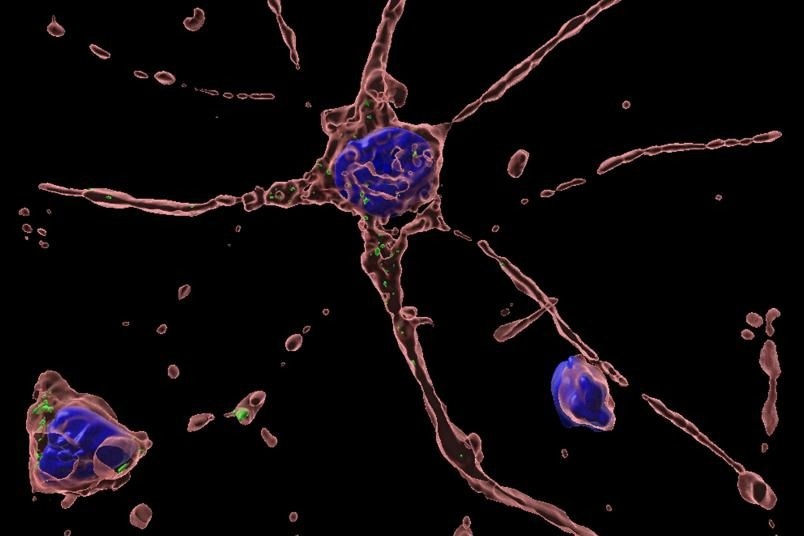Reviewed by Danielle Ellis, B.Sc.Nov 19 2024
For the first time, scientists can examine the effects of hepatitis E viruses on nerve cells using a novel cell model.
 Primary neurons from human kidney cells infected with Hepatitis E and excreted in the urine. Image Credit: Molekulare und Medizinische Virologie, Ruhr University Bochum
Primary neurons from human kidney cells infected with Hepatitis E and excreted in the urine. Image Credit: Molekulare und Medizinische Virologie, Ruhr University Bochum
Liver infections are usually caused by Hepatitis E viruses (HEV). However, they can potentially cause neurological diseases and infect other organs. People still do not fully understand how this process operates.
A research team led by Michelle Jagst and Professor Eike Steinmann from Ruhr University Bochum, Germany's Department of Molecular and Medical Virology, in partnership with Dr. Barbara Gisevius' research group at Professor Ralf Gold's Research Department of Neuroscience, has created a cell model for the first time to investigate how the virus interacts with nerve cells.
The researchers used this model to demonstrate that the virus may directly infect cells and that the cells are unable to defend themselves. By using this model, the researchers demonstrated that the virus can directly infect cells and that the cells are unable to mount an immunological defense against it. The study was published in the journal Proceedings of the National Academy of Sciences.
Despite being widespread throughout the world, hepatitis E frequently goes undiagnosed.
There is no precise data on how often the infection affects the neurological system.”
Michelle Jagst, Department of Molecular and Medical Virology, Ruhr University Bochum
It is known that up to 11% of people with specific neurological disorders, including neuralgic amyotrophy and Guillain-Barré syndrome, either have HEV antibodies or are infected with the virus.
Cells are Infected Directly
The study team is using a cell model created by the study Department of Neuroscience to learn more. It allows them to investigate the effects of hepatitis E viruses on nerve cells for the first time.
We take human kidney cells that are excreted in the urine and reprogram them to evolve into nerve cells.”
Barbara Gisevius, Ruhr University Bochum
The researchers employed these so-called primary neurons to determine that hepatitis E viruses are capable of infecting nerve cells directly. Because of their weak immune response, the nerve cells are unable to defend themselves against the virus.
Our findings indicate that the neurological effects of HEV may be due – at least in part – to a direct infection of the nerve cells and not exclusively to other mechanisms such as a reaction of the immune system, even if the latter could also play a role.”
Eike Steinmann, Professor, Ruhr University Bochum
Additionally, the researchers noticed that nerve cells' projections shorten when they come into contact with HEV.
“This is an indication of morphological changes caused by the virus, which can also be observed in other viral diseases,” according to the researchers.
The researchers will keep working to comprehend how HEV and neurons interact in the future.
“For example, it would be interesting to compare the nerve cells of healthy and HEV-infected people,” concluded Michelle Jagst.
Source:
Journal reference:
Jagst, M., et al. (2024) Modeling extrahepatic hepatitis E virus infection in induced human primary neurons. Proceedings of the National Academy of Sciences. doi.org/10.1073/pnas.2411434121.